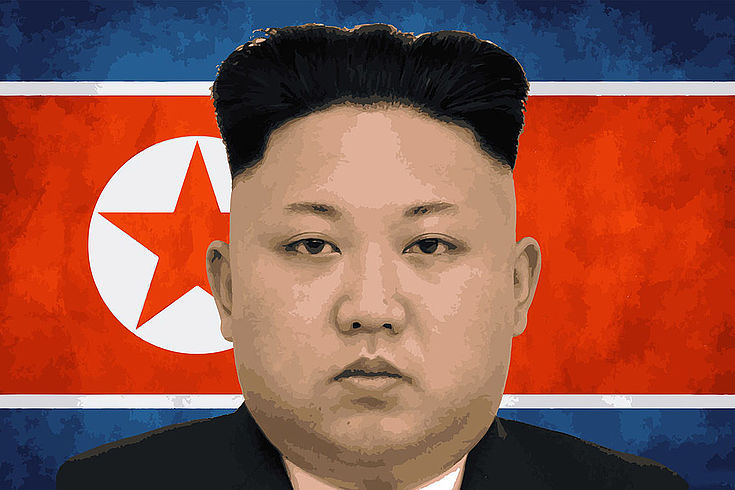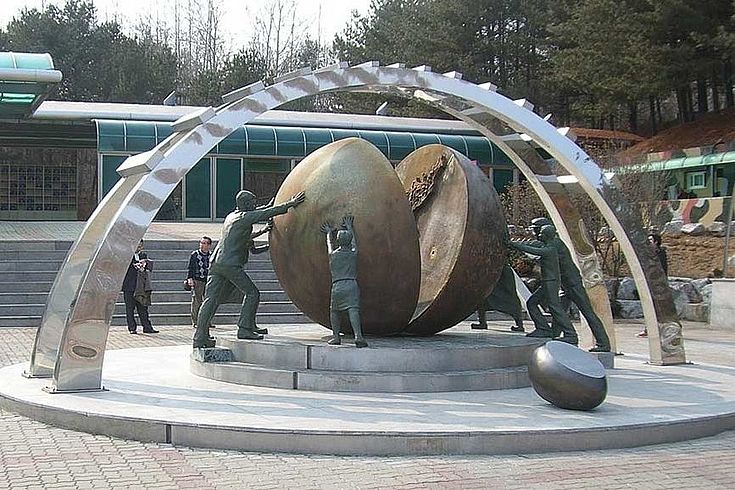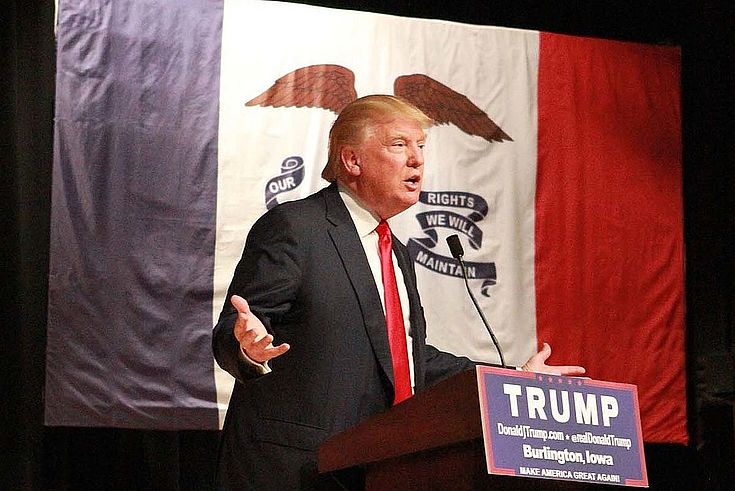Opinion: Current Events
A Chance for Actual Peace?
The events currently occurring on the Korean Peninsula are of surprisingly positive nature especially considering the fact that the situation has been on a steady decline since 2016. After the shocking peace offer proposed by Kim Jong-Un in his New Year's speech and the overall positive proceedings at the Winter Olympics with North Korea's participation, the real thunderbolt is upon us: A high-profile visit from Moon Jae-In's Safety Advisor Chung Eui-Yong, along with two other political heavy-weights in the North-South-Dialogue, Chief of Intelligence Suh Hoon, and Reunification Vice Minister Chun Hae-Sung brought not only a rare and direct encounter with the North Korean ruler Kim Jong-Un, but also as a concrete and unexpectedly quick result, a summit which is to be held at the end of April on the South Korean side of the Demilitarization Zone (DMZ) in Panmunjom. At the same time North Korea has, according to South Korean interlocuters, announced that they wish to have a serious discussion with the USA about denuclearization. It is moreover been accepted that the upcoming maneuver (after the Paralympics in March) between the USA and South Korea shall be taking place. North Korea however, will not be providing preconditions like humanitarian aid.
Always good for a surprise: Kim Jong-Un has invited Donald Trump to a meeting. He accepted.
VBORODINOVA; CC0; PIXABAY
Summit Meeting Planned
The Icing on the cake came when the national security advisor Chung Eui-Yong visited the USA. He conveyed an invitation from Kim Jong-Un to a summit, which should take place as soon as possible, between the USA and North Korea. The American president Donald Trump accepted the offer, saying it would take place before the month of May. Even though the conditions, such as the location, are not known, a summit such as this one would truly be a sensation. More importantly however, said summit gravely differs from previous attempts to lessen the tension between the two countries.
Firstly, this would be the first time that a North-South Korean Summit were to be held in South Korea. Even though reciprocity should be a given, both of the two previous summits were held in Pyongyang. One of the reasons for this was that leader Kim Jong-Un and his late father Kim Jong-Il had found a trip to South Korea too risky because of the possibility of a coup happening while they were away. On the other hand, Pyongyang, with its radiating confidence, portrayed a certain message to the public - the summit as a pilgrimage of the South Korean president to the supreme ruler in the North. The first argument is still valid, probably more than ever before. Because of this, the fact that the summit is being hosted on the South side of the DMZ is a good compromise, since Kim Jong-Un wasn't ready to inevitably show Seoul (even with censoring) to his people. In conclusion, the event will be held in the South, without North Korea's leader having to move to far from his center of power.
Hopes for a real peace? A solution to the nuclear conflict could be within reach.
WREINDL; CC0; PIXABAY
No declining pressure without results
Second of all, this could be the first time in 10 years that there is a real opportunity for a peaceful development, because there is a package deal between talks with the US on denuclearization and summits ergo further relaxation. North Korea's preconditions for this (security guarantee for the existence of the North Korean regime) can barely be met by any government in the world (because the main threat for the stability of North Korea isn't external but internal, the logical consequence of a possible opening of the country). Also, North Korea could still make the withdrawal of the US troops from South Korea an almost impossible precondition, but at least North Korea moved a lot from its former cementation of the nuclear power stated in the constitution and in the party statute. This is, if it can be confirmed in the subsequent discussions, a significant weakening of the North Korean negotiating position, because it shows that at least in principle denuclearization remains possible.
It is also important that so far, the efforts of President Moon and President Trump, although they sometimes seem completely opposite, but in the sense of "good cop, bad cop" have gone in the same direction. Moon Jae-In has just reaffirmed that there will be no declining pressure without denuclearization results. Trump has immediately taken North Korea up on their offer.
Third of all the timing of the summit, corresponding to a relatively early time in President Moons term, will be playing a positive role: The last summit in 2007 was a kind of farewell gift to leftist President Roh Moo-Hyun and campaigning help for the reunification minister Chung Dong-Yong, which ultimately failed completely. The results of this summit will have to be implemented by President Moon, and so there is a much greater chance that mainly realistic projects will be discussed.
Chinese-Korean bridge of peace over the border river Yalu. The majority of trade between the two countries takes place here. Whether or not trade sanctions are being followed is hard to control.
SILLWZ; CC0; PIXABAY
Russia, China, and the question of sanctions
Fourth, the international framework for the summit has completely changed. In the past, there was a wider margin for an inter-Korean dialogue, because the nuclear crisis was only in an early stage; now there is a tight corset of international sanctions towards the threat that originates from North Korea's nuclear arsenal. It certainly reduces the chances to come to achieve a good result. At the same time, it significantly increases the chances that the inter-Korean relations will not be abused as a strategic maneuver to avoid international condemnation as it was done in the past. Certainly, it takes an continuous cooperation between the United States and South Korea, but as well as between the U.S., China, and Russia. It seems, that President Moon is aware of this situation. Yesterday he sent a clear message about the strengthening of the defense readiness to the public. However, the future of the united front including China and Russia against North Korean nuclear weapons remains to be seen. Both China and Russia are already bypassing the sanctions in many cases. China has just rejected the admission of additional North Korean ships onto the list of sanctions. There is a risk that the North Korean willingness for talks - not results - will already be perceived as sufficient to remove sanctions quickly. The catastrophically decision of the United States to start a global trade war is in this sense unfortunately not very helpful.
Fifth, there is the announcement to set up a direct telephone line between both sides on the highest level, which can be seen as a potential positive development. Until now, there were only contacts on the working level, which could be cut easily. The establishment of a red telephone would be an effective measure that could help to prevent the escalation of conflicts. Noteworthy in this context were also Kim Jong-Un's comments spread by South Korea, "President Moon could sleep peacefully in the future und didn´t need to convene his national Security Council early in the morning; there is a telephone line now, over which everything could be discussed." This obviously facetious remarks (the previous missile tests always took place early in the morning and as a result there has been the regular convocation of the South Korean security council) show the lightness of handling the denuclearization, which are in full contrast to the officially pompous and grandiose justification of the nuclear weapons. That is not unimportant, it shows the negotiating scope of North Korea.
Sixth, the first summit between North Korea and the United States is an unprecedented chance to discuss problems on the highest political level. Especially in light of the personalities of Kim Jong-Un and Donald Trump, this could be a better way than tough negotiations on the working level without results in the end. Overall, the two summits are a historic opportunity to achieve a negotiated solution in Korea - whether they lead to the desired denuclearization of the North is of course still another question. Many aspects still remain unclear.
Not long ago, Donald Trump called Kim Jong-Un a “little rocket man” and threatened him with “fire and fury”. Will he really meet him?
DAVEDAVIDSONCOM; CC0; PIXABAY
Willingness for nuclear disarmament?
First of all, the statements about North Korea's willingness for denuclearization and acceptance of US-South Korean maneuvers are reports solely from the South Korean side. What North Korea really said and what it says to the public remains yet to be seen. Secondly, the story of the summit meetings and their results is (just like North Korea's peace offensive in general) very mixed: a sudden end could lie ahead if certain goals (like the task of China's and Russia's strict sanctions) are reached. China's caution is also very interesting and could have positive, but also negative impact on the peace process on the Korean Peninsula. Thirdly, a disappointment at the summit meeting - for example because South Korea can't implement any of North Korea's goals (massive economic support, re-opening of the Kaesong Industrial Complex or the Kumgangsan tourism project) because of the international law situation - could lead to an early end of the current euphoria.
We shouldn't forget that after all of this, we still have to consider North Korea's motivation behind its peace offensive. Only if this is clear we can assess if this policy of détente can have long-lasting success and can take respective measures in the policy towards North Korea. If North Korea's peace offers are a consequence of economic pressure due to the sanctions (for example triggered by the fear that foreign exchange reserves are getting scarce or that the stop of imports from China could lead to unrest especially by the elites), the prime objective has to be to keep up the pressure as long as possible. One possibility could be an agreement with China and Russia to reach an automatic reinstatement of sanctions (without voting in the world security council) if North Korea doesn't fulfill certain conditions or stops negotiations. However, the USA is starting a trade war is the worst possible scenario for such a solution. If North Korea is just buying time with its peace offer to enhance its rocket technology (especially the re-entry technology of the warhead), we have to uncover this motivation as soon as possible. Seeing North Korea enthusiastic for peace is making many observers suspicious for good reason. On another note, North Korea's leaders could be of the opinion that they have reached enough technological competence and can now turn to the second pillar of the "Byungjin"-Policy (a kind of canons-and-butter-policy), that is economic development. In this case, it is important that the world community in unison lets North Korea know that there can only be a long-term solution without nuclear weapons.
Despite all caution, it must be said that the current meetings are positive. The biggest problem on the Korean Peninsula are not the weapon systems, but the lack of trust between both sides. More frequent meetings are a good beginning to build trust at least to some extent. We can only hope that this trust grows and can be turned into lasting peace. Especially the relation between North Korea and the USA. Germany, having profited more than any other country from the trust-building 'Conference on Security and Co-operation in Europe' process, should be more active in supporting trust-building measures.




